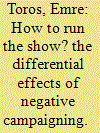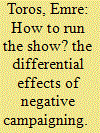|
|
|
Sort Order |
|
|
|
Items / Page
|
|
|
|
|
|
|
| Srl | Item |
| 1 |
ID:
181014


|
|
|
|
|
| Summary/Abstract |
Concerns about electoral integrity have increasingly become the focus of political science analysis in recent years, but there has been very little systematic research on the strategic use of allegations of electoral wrong-doing for political advantage. Drawing on the literatures on legitimacy and electoral integrity, this paper develops a theoretical perspective on the strategic use of allegations of electoral impropriety for electoral ends, which, when such allegations are unjustified, constitutes a previously under-explored form of ‘meta-manipulation’. An original dataset, based on press reports from Turkey at the time of the 2014 local and June 2015 parliamentary elections, is used to test these hypotheses. The analysis shows that the governing party predominantly accused opposition parties of violent practices. The opposition parties, on the other hand, used allegations of electoral fraud and other forms of misconduct coupled with violence accusations against the governing party.
|
|
|
|
|
|
|
|
|
|
|
|
|
|
|
|
| 2 |
ID:
152451


|
|
|
|
|
| Summary/Abstract |
Although the academic literature on negative campaigning is growing, more research is needed to contribute to the theoretical and empirical knowledge on the phenomenon. Accordingly, this article examines the impact of negative political messages on political trust in Turkey. The findings indicate that although exposure to negativity alters the trust level of the citizens, this impact is not uniform and dependent on party identifications.
|
|
|
|
|
|
|
|
|
|
|
|
|
|
|
|
| 3 |
ID:
152452


|
|
|
|
|
| Summary/Abstract |
Although the academic literature on negative campaigning is growing, more research is needed to contribute to the theoretical and empirical knowledge on the phenomenon. Accordingly, this article examines the impact of negative political messages on political trust in Turkey. The findings indicate that although exposure to negativity alters the trust level of the citizens, this impact is not uniform and dependent on party identifications.
|
|
|
|
|
|
|
|
|
|
|
|
|
|
|
|
| 4 |
ID:
142293


|
|
|
|
|
| Summary/Abstract |
The academic literature on negative campaigning is growing. As an attempt to contribute to the theoretical and empirical knowledge on the phenomena, this study focuses on the Turkish elections and tries to provide answers to the following research questions: What is the level of negativity in Turkish electoral campaigns and which factors are salient for going negative for Turkish political parties? Findings display the fact that negativity is noticeably high in Turkey, and incumbency, ideology and time focus of messages are salient factors for negativity.
|
|
|
|
|
|
|
|
|
|
|
|
|
|
|
|
| 5 |
ID:
139256


|
|
|
|
|
| Summary/Abstract |
Despite major differences among political systems, one can conduct new research on pledge fulfillment by examining previously ignored cases. Accordingly, this article extends the literature by developing a new analysis for the Turkish context. The main contribution of this paper is the introduction of explicit models, which evaluate political pledges and their fulfillment by using an original data set. In particular, this study reveals the following facts: (a) in a comparative perspective, pledge fulfillment is low in Turkey and (b) its governmental forms and economic performance have an impact on pledge fulfillment.
|
|
|
|
|
|
|
|
|
|
|
|
|
|
|
|
| 6 |
ID:
185549


|
|
|
|
|
| Summary/Abstract |
The freedom of media is an essential component for democratic settings; however, in some contexts, citizens experience several barriers to enjoy this right in full. Replacing conventional media channels, social media is becoming an indispensable medium to express and discuss politics in such environments. Yet, there is little consensus in the literature about how social media relates to offline political participation, especially in settings where citizens do not experience media freedom in full. By using survey data that has been collected after the Turkish general election of 2018, this article aims to display the relationship between social media use and offline political participation. The analysis reveals offline political participation is related to sharing political views online and exposure to alternative political ideas.
|
|
|
|
|
|
|
|
|
|
|
|
|
|
|
|
| 7 |
ID:
079981


|
|
|
|
|
| Publication |
2007.
|
| Summary/Abstract |
This study is an analysis of the contribution of civil society to democratic consolidation in Turkey. It will try to understand this problem by assessing civil society's formal structure, legal framework, and internal values, as well as its impact during the consolidation process. While doing so, this study will base itself on a combination of theories that link civil society to democratic consolidation with an empirical tool for the assessment of this linkage. It confirms that despite the difficulties, civil society in Turkey is developing itself for the establishment of a more decentralized pluralistic democracy, which will stipulate a more institutionalized democratic system
|
|
|
|
|
|
|
|
|
|
|
|
|
|
|
|
|
|
|
|
|